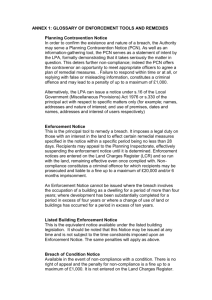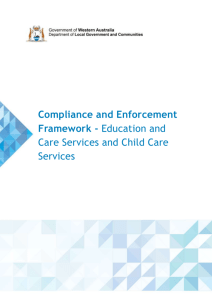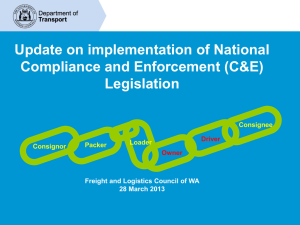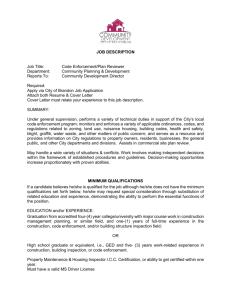trade measurement compliance and enforcement policy
advertisement
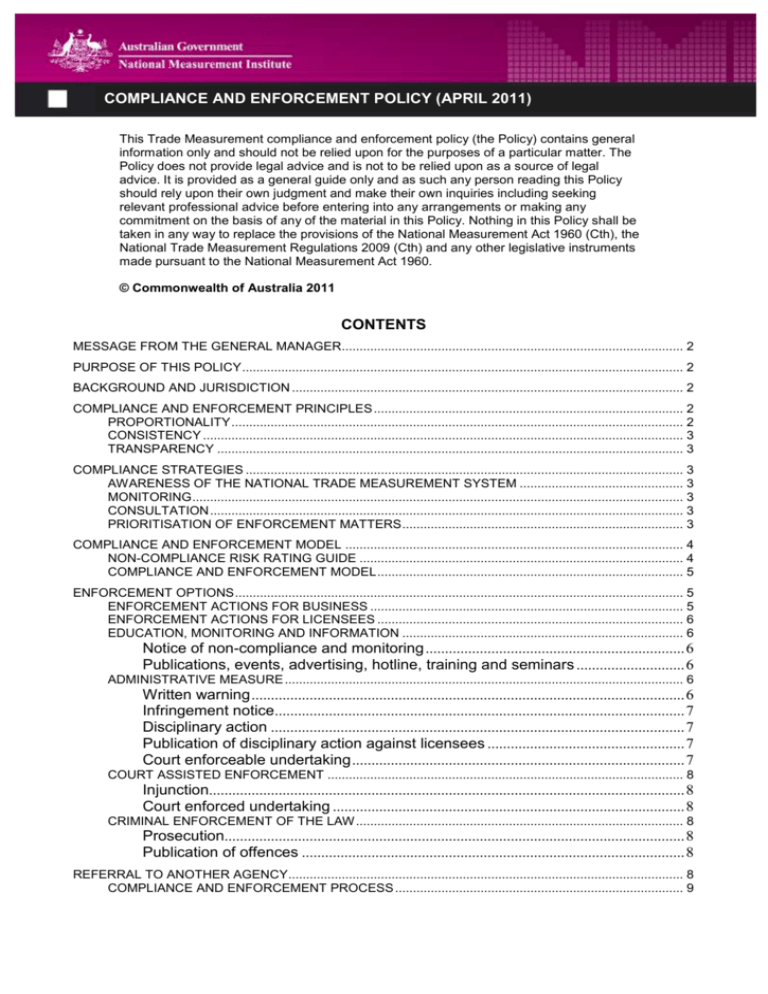
COMPLIANCE AND ENFORCEMENT POLICY (APRIL 2011) This Trade Measurement compliance and enforcement policy (the Policy) contains general information only and should not be relied upon for the purposes of a particular matter. The Policy does not provide legal advice and is not to be relied upon as a source of legal advice. It is provided as a general guide only and as such any person reading this Policy should rely upon their own judgment and make their own inquiries including seeking relevant professional advice before entering into any arrangements or making any commitment on the basis of any of the material in this Policy. Nothing in this Policy shall be taken in any way to replace the provisions of the National Measurement Act 1960 (Cth), the National Trade Measurement Regulations 2009 (Cth) and any other legislative instruments made pursuant to the National Measurement Act 1960. © Commonwealth of Australia 2011 CONTENTS MESSAGE FROM THE GENERAL MANAGER................................................................................................ 2 PURPOSE OF THIS POLICY ............................................................................................................................ 2 BACKGROUND AND JURISDICTION .............................................................................................................. 2 COMPLIANCE AND ENFORCEMENT PRINCIPLES ....................................................................................... 2 PROPORTIONALITY ............................................................................................................................... 2 CONSISTENCY ....................................................................................................................................... 3 TRANSPARENCY ................................................................................................................................... 3 COMPLIANCE STRATEGIES ........................................................................................................................... 3 AWARENESS OF THE NATIONAL TRADE MEASUREMENT SYSTEM .............................................. 3 MONITORING .......................................................................................................................................... 3 CONSULTATION ..................................................................................................................................... 3 PRIORITISATION OF ENFORCEMENT MATTERS ............................................................................... 3 COMPLIANCE AND ENFORCEMENT MODEL ............................................................................................... 4 NON-COMPLIANCE RISK RATING GUIDE ........................................................................................... 4 COMPLIANCE AND ENFORCEMENT MODEL ...................................................................................... 5 ENFORCEMENT OPTIONS .............................................................................................................................. 5 ENFORCEMENT ACTIONS FOR BUSINESS ........................................................................................ 5 ENFORCEMENT ACTIONS FOR LICENSEES ...................................................................................... 6 EDUCATION, MONITORING AND INFORMATION ............................................................................... 6 Notice of non-compliance and monitoring ................................................................... 6 Publications, events, advertising, hotline, training and seminars ............................ 6 ADMINISTRATIVE MEASURE ................................................................................................................ 6 Written warning ................................................................................................................ 6 Infringement notice.......................................................................................................... 7 Disciplinary action ........................................................................................................... 7 Publication of disciplinary action against licensees ................................................... 7 Court enforceable undertaking ...................................................................................... 7 COURT ASSISTED ENFORCEMENT .................................................................................................... 8 Injunction........................................................................................................................... 8 Court enforced undertaking ........................................................................................... 8 CRIMINAL ENFORCEMENT OF THE LAW ............................................................................................ 8 Prosecution....................................................................................................................... 8 Publication of offences ................................................................................................... 8 REFERRAL TO ANOTHER AGENCY ............................................................................................................... 8 COMPLIANCE AND ENFORCEMENT PROCESS ................................................................................. 9 MESSAGE FROM THE GENERAL MANAGER On 1 July 2010, the new national system of trade measurement commenced under the administration and regulatory oversight of the National Measurement Institute (NMI) a division of the Australian Government’s Department of Innovation, Industry, Science and Research. The NMI is Australia’s peak measurement organisation, responsible for maintaining the nation’s primary standards of measurement and for providing the legal and technical framework for the dissemination of those standards. NMI is the only ‘one-stop shop’ for all disciplines of measurement in Australia – analytical, biological, chemical, physical and legal. We provide measurement expertise, calibration services, chemical and biological analyses and pattern approval testing. In Australia an estimated value of $400 billion of goods based on measurement are traded every year. All of this involves measuring volume, weight, length, area, or the number of goods being bought and sold. NMI takes its responsibilities for ensuring compliance with the trade measurement regulatory framework seriously. We aim to ensure that businesses are well informed through timely and concise communications. This policy has been prepared to assist businesses, organisations and the community in understanding the riskbased approach we take to the application of our compliance and enforcement options in the marketplace. Dr Valérie Villière General Manager, Legal Metrology Branch, National Measurement Institute PURPOSE OF THIS POLICY The purpose of the Trade Measurement Compliance and Enforcement Policy is to set out the principles adopted by the National Measurement Institute (NMI) for achieving compliance with the national trade measurement legislation in the marketplace. The policy outlines the compliance strategies, priorities and enforcement options available to NMI. BACKGROUND AND JURISDICTION NMI is Australia’s peak measurement organisation, a division of the Department of Innovation, Industry, Science and Research in the Australian Government. NMI is responsible for the administration of the national measurement legislation and is Australia’s official representative in activities undertaken through the two international treaties in measurement to which Australia is a signatory, the Metre Convention and the Convention Establishing an International Organization of Legal Metrology. The decision by the Council of Australian Governments in April 2007 to have a single regulatory system for trade measurement administered by the Commonwealth has resulted in NMI also assuming responsibility for the national trade measurement system in 2010. NMI aims to provide an efficient national trade measurement system across Australia for the community, business and government, and to provide confidence in all aspects of trade measurement. The Commonwealth legislative framework for national measurement including national trade measurement comprises: National Measurement Act 1960 National Measurement Regulations 1999 National Trade Measurement Regulations 2009 National Measurement Guidelines 1999 COMPLIANCE AND ENFORCEMENT PRINCIPLES NMI exercises its compliance and enforcement powers using the principles of proportionality, consistency and transparency. PROPORTIONALITY Any enforcement action undertaken will be proportionate to the seriousness of the breach of compliance and resulting consumer detriment. 2 CONSISTENCY A consistent national approach is taken in interpreting, applying and enforcing the national trade measurement legislation. TRANSPARENCY Guidance material on compliance requirements together with compliance policies and strategies are publicly available so that regulated entities understand what is expected of them and how their compliance will be monitored, judged and enforced in the event of a breach of the national trade measurement legislation. Consumers and regulated entities, where permitted, will be informed of decisions made and the grounds for the decisions. COMPLIANCE STRATEGIES NMI employs a number of strategies to achieve its compliance objectives. These include promoting awareness of the national trade measurement system, monitoring, consultation, and prioritisation of enforcement matters. AWARENESS OF THE NATIONAL TRADE MEASUREMENT SYSTEM The first strategy used by NMI to ensure compliance with the national trade measurement system is to promote a high level of awareness. In other words, NMI tries to make sure that: consumers are aware of what they have a right to expect in their purchases businesses are aware of their obligations under the national trade measurement legislation. NMI provides information on trade measurement requirements through general and targeted publications, its website and national hotline. It distributes information to consumers, businesses and licensees as well as delivering training programs to licensees. NMI trade measurement inspectors also assist businesses and licensees to understand and comply with national trade measurement requirements. MONITORING As the national trade measurement system has replaced the state and territory regimes, monitoring is employed to make sure that all businesses and licensees conform to the national trade measurement system. Monitoring may be strategic, targeted or random and include: audits of servicing licensees’ quality management system and competency in verifying measuring instruments checks of measuring instruments used for trade checks of markings and measurements of prepacked or non-pre-packed products for sale checks of public weighbridges. Trade measurement inspectors throughout Australia conduct inspections of businesses, and respond to reports from consumers and other agencies on alleged contraventions of the national trade measurement legislation. CONSULTATION NMI consults with consumer groups and industry associations, and will respond to information and advice obtained from them in order to address any compliance issues or concerns relating to the national trade measurement legislation. PRIORITISATION OF ENFORCEMENT MATTERS Priority guidelines are set to ensure a balance between the appropriate use of compliance resources and effective compliance with the national trade measurement legislation. They are based on the levels of 3 consequence and likelihood of non-compliance. The aim is to achieve a high level of consumer and business protection without unnecessary compliance costs or burdens for businesses and licensees. The factors in determining enforcement priorities include: the extent of financial detriment to consumers or to industry in any contravention of the national trade measurement legislation the extent of repeat contravention over a specified period of time, whether it is the same or different provisions of the national trade measurement legislation referrals from any consumer protection agencies or regulators particular contraventions of high public interest special circumstances that give enforcement actions added significance such as deterrence of a noncompliant practice within an industry and protection of particularly vulnerable or disadvantaged consumer groups. COMPLIANCE AND ENFORCEMENT MODEL The compliance and enforcement model is a risk-based model where the major determining factors are consequence and likelihood of non-compliance. Consequence is defined as economic impact and business and consumer confidence in the regulatory system. Likelihood is defined as the frequency of non-compliance. An efficient and effective trade measurement compliance system is integral to the functioning of our economy both domestically and internationally. This compliance and enforcement model seeks to support businesses by providing clear directions in trade measurement obligations and provides consumers the assurity that correct measure is good business. NON-COMPLIANCE RISK RATING GUIDE 4 COMPLIANCE AND ENFORCEMENT MODEL ENFORCEMENT OPTIONS NMI’s enforcement objectives are to prevent and/ or stop or minimise contraventions of the national trade measurement legislation and deter future contravention through appropriate enforcement actions. NMI has a range of escalating enforcement options which are commensurate with both the level of consequence of non-compliance and the level of likelihood of non-compliance. Low level enforcement actions in relation to the national trade measurement legislation are employed when the consequence and likelihood of non-compliance are also low. The highest level enforcement action is prosecution. This is generally reserved for situations where the consequence and likelihood of non-compliance are also highest. NMI’s enforcement options are: education and monitoring notice of non-compliance warning – verbal and/or written infringement notice disciplinary action against licensees enforceable undertaking injunction prosecution publication of offences and disciplinary action against licensees. ENFORCEMENT ACTIONS FOR BUSINESS 5 ENFORCEMENT ACTIONS FOR LICENSEES EDUCATION, MONITORING AND INFORMATION When there is no existing contravention or when the contravention has a low level of consequence and there is minimal likelihood of continued noncompliance, NMI will employ compliance-based enforcement actions. Notice of non-compliance and monitoring Trade measurement inspectors assist business operators and companies by informing them of the type of compliance relevant to their business that is required during the course of an inspection visit. If a contravention is detected which can be rectified immediately, trade measurement inspectors will give a verbal warning and provide guidance on the rectification. Trade measurement inspectors issue a notice of non-compliance at the conclusion of an inspection if rectification of noncompliance cannot be made immediately or when appropriate. The notice provides information on the asserted contravention and the relevant provision(s) of the national trade measurement legislation contravened. This assists a business operator or company to understand the nature of the noncompliance under the law. Trade measurement inspectors will revisit noncompliant business operators or companies that have been issued with a notice of non-compliance to ensure a good understanding of compliance requirements, and compliance practice is in place. Publications, events, advertising, hotline, training and seminars NMI has a range of publications on its website and in hard copies on trade measurement requirements for different industries and products. It provides comprehensive information for servicing licensees and public weighbridge licensees. Other information resources for businesses and licensees provided by NMI include: events and advertising with new or updated information on trade measurement a national trade measurement inquiry hotline training courses and seminars. ADMINISTRATIVE MEASURE When there are low-to-moderate levels of consequence and likelihood of non-compliance, one of or some of the following enforcement actions may be undertaken. Written warning A warning letter may be issued which details the exact nature of the asserted contravention, refers to the specific provision(s) of the legislation contravened, and states the required remedial action. Written warnings will be followed up by further compliance activities. Failure to comply with a written warning will, in most cases, lead to the issuing of an infringement notice or another enforcement action against the non-compliant business operator or business. 6 Infringement notice Trade measurement inspectors may issue an infringement notice if they have reasonable grounds to believe a provision of the national trade measurement legislation has been contravened where the offence is of strict liability. A strict liability offence is one which only requires proof that a business operator or company committed a certain prohibited act. The infringement notice penalty is currently 5 penalty units for each provision believed to have been contravened (that is $550; as at April 2001, 1 penalty unit = $110). This option may be employed where: there is prima facie evidence of a contravention the contravention is not relatively severe by nature and there are no mitigating or aggravating factors there have been no previous infringement notices for similar contraventions a fine is considered a reasonable penalty. Disciplinary action Disciplinary action may be taken against a servicing licensee or a public weighbridge licensee if the licensee has failed to comply with a provision of the national trade measurement legislation or with a condition of the licence. Other grounds for disciplinary action include: the licensee has been found guilty of an offence involving fraud or dishonesty the licensee, the licensee’s employee or the licensee’s contractor is not competent to perform the appropriate functions over a specified period the licensee carries out activities in a dishonest or unfair manner. The kinds of disciplinary action that may be taken against a licensee are: reprimand imposing an additional condition on the licence suspending the licence for up to 12 months cancelling the licence. An enforceable undertaking from the licensee may be accepted in instead of, or in addition to, taking disciplinary action. Disciplinary action may also be taken against a utility meter verifier if the appointed verifier has breached a condition of the appointment. The kinds of disciplinary action that may be taken against a utility meter verifier are: reprimand varying or revoking a condition of the verifier’s appointment imposing an additional condition on the appointment suspending the appointment for up to 12 months revoking the appointment. Publication of disciplinary action against licensees When disciplinary action is taken against a servicing licensee or a public weighbridge licensee, the grounds for the disciplinary action and the disciplinary action taken may be publicised. Court enforceable undertaking NMI may accept a written undertaking by a business operator or company which admits a contravention in relation to: measuring instruments used for trade pre-packed or non-pre-packed products for sale a servicing or public weighbridge licence. The business operator or company will undertake that the contravention will not be repeated. If there is a breach of a term of the undertaking, an application for a court order directing the business operator or company to comply with the breached term and any further compensation may be made. Enforceable undertakings allow more flexibility and broader outcomes than those available through prosecutions. Successful prosecutions lead to convictions where the outcome is limited to a criminal record and/or a fine. On the other hand, enforceable undertakings can provide a range of solutions tailored to particular circumstances of non-compliance within a single remedy. This option may be employed where: an undertaking is the appropriate enforcement outcome considering the significance of the contravention for the community and the market a systemic change in a business is required to prevent future contravention there is commitment from the business operator or company to stop the conduct that led to the contravention and not recommence that conduct the business operator or company is likely to comply with the terms of the undertaking a fine is not an appropriate enforcement option. 7 COURT ASSISTED ENFORCEMENT When there are moderate-to-high levels of consequence and likelihood of non-compliance, one of the following enforcement actions may be undertaken to compel compliance. Injunction An application for an injunction may be made to restrain a business operator or company from current or future conduct that constitutes or would constitute an offence under a legislative provision relating to measuring instruments used for trade, pre-packed or non-pre-packed products for sale. An injunction may be applied for where the offence is serious and/or the impact of the offence is serious. Court enforced undertaking When there is a court enforceable undertaking and the court is satisfied that there is a breach of the term of the undertaking given by a business operator or company, it may order the business operator or company to do one or all of the following: comply with the term of the undertaking that has been breached pay an amount up to the amount of financial benefit gained which was attributable to the breach compensate a person who has suffered loss or damage as a result of the breach. The court can also make any other order that it considers appropriate. CRIMINAL ENFORCEMENT OF THE LAW The institution of criminal proceedings for the prosecution of a business operator or company is normally reserved for a more serious contravention of the national trade measurement legislation or where less severe enforcement action has not changed the non-compliant behaviour. Criminal enforcement usually indicates high levels of consequence and likelihood of non-compliance. Prosecution NMI will refer an alleged contravention to the Commonwealth Director of Public Prosecutions (CDPP) for prosecution where there is prima facie sufficient evidence that an offence has been committed and one or more of the following statements apply: the alleged offence produced or will produce significant harm to consumers or industry public interest considerations support prosecution action other enforcement options are not appropriate or have been employed but have proved ineffective the alleged contravention is of such a nature or magnitude that an effective disincentive to potential offenders is warranted and prosecution is considered to be an appropriate enforcement action the compliance history of the non-compliant business operator or company demonstrates a high compliance risk. The decision to prosecute rests with the CDPP who will assess the information and determine if there is a reasonable prospect of a conviction based on admissible, substantial and reliable evidence. In certain matters such as when the contraventions appear complex and substantial or may be of a politically sensitive nature, NMI may seek the assistance of the Australian Federal Police (AFP) to conduct investigations. When the AFP considers that there is sufficient evidence to institute criminal proceedings, it will commence prosecutions and/ or brief the CDPP. When briefed, the CDPP has the final decision on whether a prosecution is to be instituted or continued. A business operator or company found guilty of committing a criminal offence may receive: a criminal record; and/or a fine. Publication of offences Convictions may be publicised relating to the use of measuring instruments for trade, pre-packed or non-prepacked products for sale. REFERRAL TO ANOTHER AGENCY Matters that do not fall within the jurisdiction of NMI may however be referred to another Commonwealth, state or territory agency with the appropriate jurisdiction. Where possible courses of action may be available under the legislation administered by NMI and other enforcement bodies, NMI will consult with the other enforcement bodies to decide which body is responsible for undertaking the enforcement action. 8 COMPLIANCE AND ENFORCEMENT PROCESS 9

